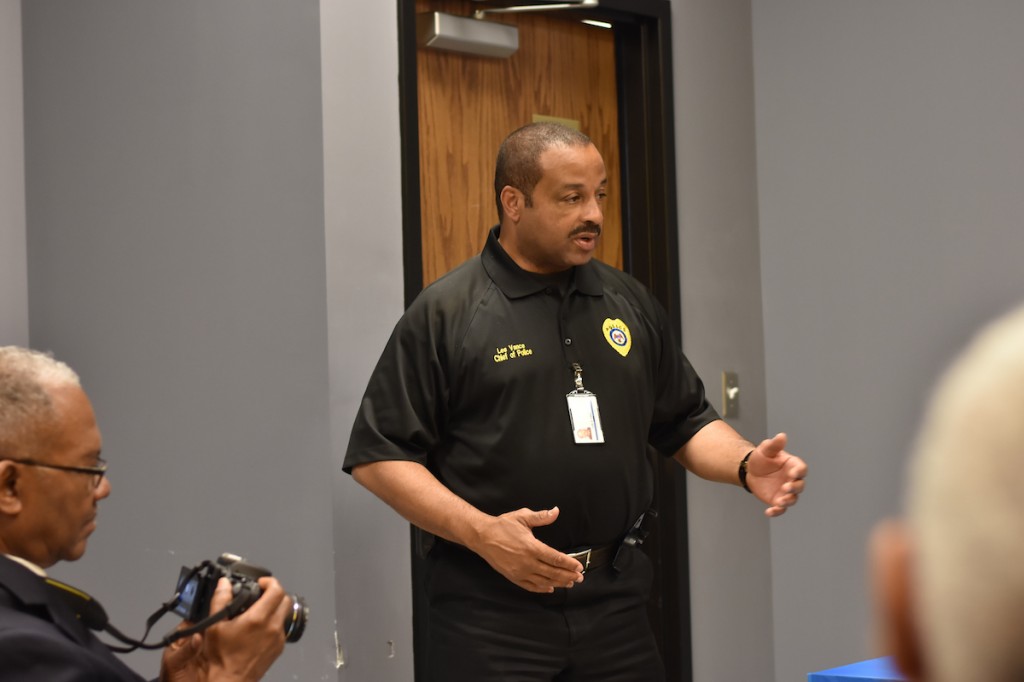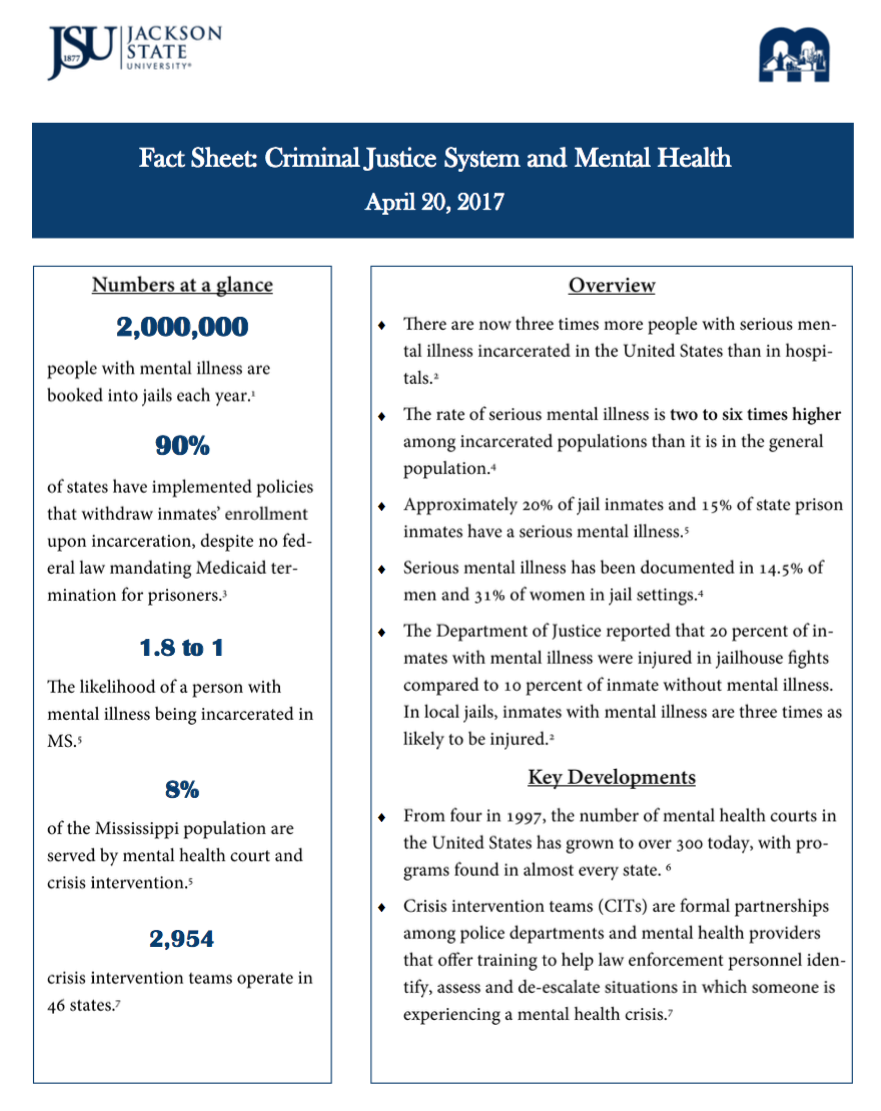
![]()
[hr]Elected officials, law enforcement and other experts in Hinds County told a Jackson State University audience Thursday that incarcerating the mentally ill is generally a bad idea and expressed dismay over budget cuts and a disbanded psychiatric unit at the Mississippi State Hospital at Whitfield.
JSU’s Mississippi Urban Research Center in the College of Public Service hosted a forum at the university’s downtown campus, and the consensus is that “jails are no place for a mentally ill person,” said Hinds County Supervisor Peggy Calhoun, expressing that Hinds County has the highest number of such detainees in the state.
Calhoun said, “Mississippi must get a handle of the situation before problems of the mentally ill overwhelm us.” Furthermore, she said the U.S. and state constitutions mandate that government entities such as Hinds County bear all expenses for incarcerated individuals, including hospitalization, medical care (also prescriptions) and recreation.
Ultimately, participants discussed ways to adequately support mentally ill individuals and lay the groundwork for building a coalition to address their needs.

Frederick O’Quinn, research analyst and associate for MURC, coordinated the event. He said officials are challenged due to a lack of sufficient funding to address mental health needs. He advocates greater coordination between law enforcement and others.
“I think it’s clear that there needs to be a coordination of services between county supervisors, the court system, sheriff, police and mental health experts. … The result will be helping the mentally ill live independently, which can be accomplished only with the support of the community,” O’Quinn said.
Other experts included Sheriff Victor Mason, Hinds board attorney Pieter Teeuwissen; Andrew Day, director of Community Services of the Mississippi Department of Mental Health; Dr. Tiffany Anderson, crisis coordinator of the Hinds Behavioral Health Services; and Jackson Police Department Chief Lee Vance.
Despite an agreement about the consequences of locking up people with mental illnesses, solutions remain elusive. Some experts say this is often complicated by a failure of state legislators to provide adequate funding as well as a shortage of professional mental healthcare providers.
“We are woefully underfunded,” said Calhoun, detailing that the county lockup facility has only one psychiatrist, one psychologist and one social worker for 104 mental health detainees. A proposal to legislators to establish a local or regional hospital never gained traction, she said.
Among those particular inmates, some have been charged with kidnapping, rape, capital murder, strong-armed robbery, etc., with the longest sentence approaching nearly five years. Also stunning, costs to support these Hinds County detainees over the two most recent fiscal years have ranged from $95,000 to $150,000 annually.
Meanwhile, Day advocates for a crisis intervention center as a way for people to admit themselves in a facility and avoid a potentially worsening situation. Unfortunately, ideas such as this face an uphill battle, especially with an expected $19.5 million budget cut next year and the closure of at least 500 beds in the Mississippi State Hospital in past years.
Authorities are struggling to comply with consent decree
For now, Mississippi is struggling to comply with a consent decree after the U.S. Department of Justice filed a lawsuit last year to compel the state to provide adequate services for individuals with mental illness. The DOJ accused the state of discriminating against adults with mental illness by relying heavily on institutionalization, which is deemed a violation of the Americans with Disabilities Act.
“My hands are getting tighter because of the consent decree,” said Sheriff Mason. He shared that his department has begun retraining his enforcement staff. “My goal is to fall in line. What really hurt me is when the facility in Whitfield was shut down.” He laments that when an unfortunate situation occurs the mentally ill often are locked up. “We’re trying to keep our own sanity and the jail intact.” Nevertheless, he warned, “My people have to defend themselves against those who have a history of mental illness.” He said deputies try to avoid physical altercations.

His suggestion is that “somebody needs to reopen those 29 beds at Whitfield. Otherwise, if the mentally ill commits a crime, they will come to the ‘Mason Inn,’ where we do leave the light on for you.”
Chief Vance agrees with providing better solutions than incarceration.
“We need somewhere to take those with mental illness to qualified individuals. … Law enforcement is not the ideal component to handle those situations. When mental illness intersects with criminal behavior … some tactics can run afoul of the law.” He said dilemmas such as domestic violence and driving under the influence certainly will land these individuals in jail.
Anderson said, “The goal is to disrupt the pattern of having them rotate in and out of the jail system and get them to treatment.” She said they also provide training to law enforcement officials so they can recognize symptoms of mental illness and offer “de-escalation techniques – how to talk to people … rather than take the path of least resistance.”
Vance called for more coordinated efforts and partnerships with organizations skilled in handling psychiatric matters.
‘Many problems migrate our way’
Moderator Teeuwissen describes Hinds County as having a unique demographic situation “because we are the capital, and many problems migrate our way.”
Generally, he said, people are unwilling to endorse measures to develop facilities. “They say, ‘Not in my backyard.’ In fact, we all encounter people daily with mental health issues.”
Anderson said she endorses the use of peer support – even if they lack the professional background – as a source for providing core services to those with mental illness.
Anderson said these individuals have experiences that would be useful. “Right now, there are a lot of people who don’t know what mental illness is because education in the community about this issue is not really there.”
Also, Anderson is the mobile crisis coordinator for Hinds’ behavioral health facility. Her team of 10, which covers more than 800 square miles, is available around the clock every day and intervenes when civilians are arrested. The group assesses individuals suspected of suffering from mental illness and, working with authorities, tries to divert them from being locked up, thus saving the county money.
Anderson said she recalls a time when there was a strained relationship between mental health providers and law enforcement officials. “Police would often say, ‘I’m not down with this hug-a-thug.’ Now, however, there’s more coordination of efforts,” said Anderson, acknowledging that the jail is sometimes the first stop for “treatment” for those with mental illness.
As for the police department, Vance seeks a more solid resolution, repeating that “mental illness is not a reason to be locked up.” After his own tense experiences of dealing with mentally ill civilians, he warns that “without a long-term solution, they will end up in the jail system, adding to homelessness. We’re being called for police service, and the officer is left with the question of what do I do?”







